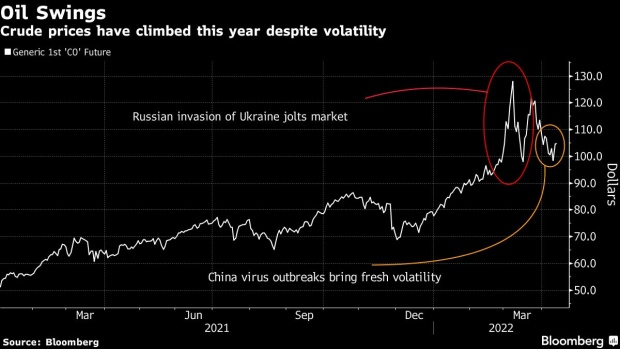Apr 13, 2022
ARCM Hedge Fund Gains 19% After Move to Distressed Equities
, Bloomberg News

(Bloomberg) -- Alp Ercil’s $3.5 billion Asia Research & Capital Management scored double-digit gains at its latest hedge fund last quarter, a year after pivoting toward distressed equities in base metals and energy amid the transition to cleaner fuels.
ARCM’s fourth distressed asset fund returned an estimated 19% after fees in the three months ended March 31, according to a person with knowledge of the matter. An update sent to investors didn’t provide details on what drove the gain, the person said, asking not to be identified as the information is private.
Yusuf Haque, chief operating officer of the Hong Kong-based firm, declined to comment.
Following pledges by countries around the world to curb carbon emissions, investors have been piling into electric vehicles and solar companies, driving their valuations to hefty levels. ARCM is finding gems in traditional industries, where years of under-investment have left them unable to meet extra demand created by the energy transition.
For example, the shift to electric vehicles would require additional power and entail grid upgrades, Ercil said during a September 2021 webinar hosted by Jawad Mian’s macro research firm Stray Reflections. A transcript of the discussions was seen by Bloomberg News.
The replacement of old, less energy-efficient air-conditioners and industrial upgrades would translate into massive capital expenditure, leading to higher demand for lithium, copper, aluminum and steel, according to the transcript. The move away from globalization toward duplicated, localized supply chains is also fueling demand for resources.
On the supply side, energy and resource producers emerging from more than a decade of cost-cutting and consolidation would be disciplined in making new investments, Ercil added during the webinar. To meet its carbon targets, China will have to slash capacity in materials production, including steel, aluminum and some chemicals, which rely on coal-fired power generation. Oil and coking coal producers worldwide are finding it difficult to ramp up capacity in an era of heightened environmental, social and governance concerns.
Distressed equities bets on cyclical industries and commodities drove a 28% gain for the ARCM fund last year, Bloomberg reported earlier.
Prices of metals including aluminum and nickel have soared this year as Russia’s invasion of Ukraine fueled fears of supply disruptions. The war also pushed oil higher, though prices have eased recently on expectations that slower economic growth will hurt demand.
Before striking out on his own, Ercil was Asia head of Perry Capital, focusing on global investments in energy and cyclical industries at the New York-based hedge fund firm. ARCM has tilted toward energy and resources since its 2011 inception.
It started a dedicated energy dislocation fund in 2015, the year when Brent oil hit $37. In 2020, when oil prices sank to a fresh low and the pandemic shut borders and disrupted economies, ARCM heaped bullish bets on lower-rated, long-duration U.S. investment-grade bonds, notably energy companies. In early 2021, it shifted to distressed equity opportunities in energy and resources companies.
While its previous funds were close-ended vehicles with finite lives, ARCM late last year won endorsement from investors to transform its fourth distressed-assets fund into an open-ended structure with multi-year lockups on inflows, allowing clients to stay invested for long periods of time, said the person. The firm returned $1 billion to investors in 2021 after exiting investments made by earlier funds.
©2022 Bloomberg L.P.






